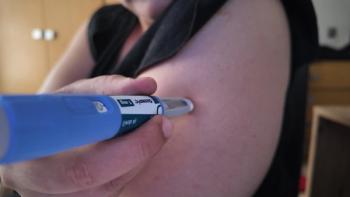
Examining the Effect of an Adapted Screening Tool to Alleviate Patient Distress
Investigators improved the rate of patients being screened to over 68% for distress and supportive care needs by using a patient-reported tool.
Several validated tools exist to measure patient physical, mental, and social health as they are being treated for cancer, such as the National Comprehensive Cancer Network’s (NCCN) distress thermometer and the Patient-Reported Outcomes Measurement Information System (PROMIS).
However, investigators who are part of the
At the 2019 ASCO Annual Meeting, they presented 2 posters. Christine Weldon, an adjunct instructor at Northwestern University Feinberg School of Medicine, discussed the findings in an interview with Oncology Nursing News®.
Oncology Nursing News®: Please discuss the findings of the studies.
Weldon: We collected quality metrics at each of the cancer centers that has been involved with the Supportive Oncology Collaborative. We started in 2014 with data from before they did any improvements and started to track what percentage of patients are being screened for their supportive needs. Supportive needs being distress, social work needs, practical needs, nutrition, physical symptoms, pain, fatigue, physical function, and a number of other factors. We put together data saying how many patients were being screened and then how many patients were receiving those services. We also asked questions about referral to palliative care. Patients being told specifically what the goal of their care is and patients also understanding their prognosis. We collected those for 2014 to 2017 and now we are doing 2018. We improved the rate of patients being screened to over 68% not just for distress but screened also for their supportive care needs. We ended up from about a third of patients getting services to over 56% of patients getting services.
The second poster is focused on the screening tool. In 2014 and 2015, we started to look at all the screening tools out there. The NCCN has a well-used distress thermometer. But, unfortunately, they were only giving that information to a social work team, so the social work team was using it to help with practical issues but on there was a whole list of physical problems that patients were facing. We took that as the basis and replaced the distress thermometer with the PHQ4 (Patient Health Questionnaire 4). This aligned with the ASCO 2014 distress guidelines, then we added other components that were necessary based on guidelines and literature around palliative care distress management, nutrition, infection, and a number of other cancer guidelines that were outside of direct treatment. The data was across eight cancer centers, and the poster [presented at ASCO] represents the first 12,000 patients. We found [that] patients with elevated distress or anxiety scores across the board are going to have elevated levels of pain, fatigue, dry skin and sleep issues; lower physical function scores; and practical and nutrition concerns. We found distress alone is not enough to support the patient. If you start to deal with these other symptoms and the
Can you expand upon the patient-reported screening tool?
As I mentioned, the tool we developed in 2014 to 2015 was from a bunch of instruments that already existed. We said let’s replace the [NCCN] thermometer with the PHQ4, which is looking at distress and anxiety. We took the MNA tool and replaced it with an adjusted mini nutrition scale. We also put in the short form for PROMIS for fatigue and physical function. Last year, ASCO came out with new geriatric patient guidelines so we enhanced the tool with some questions about falls risk. We added 2 health literacy questions and a section on self-care concerns that was adapted from the PROMIS self-care instrumental support short form. We made them yes/no questions. And then we added some components that are really important to our patients, such as teeth and skin issues and tobacco and alcohol use.
To help the clinicians we developed over 50 reference documents for every single item on the tool. There are 1-page reference documents that at the top have a reference summary that talks about what to do if a patient says yes to dry skin. They also have links for patients. The intent is to help patients with self-management and [give] them some control of their care.
More than 25% of patients in our screening tool assessment had sleep issues. The sleep handout talks about sleep hygiene, such as not having caffeine after a certain time and avoiding alcohol before bed. One of our nutrition questions is about taste, which is a big side effect that a lot of patients face. As simple as it seems, eating with a plastic utensil sometimes alleviates some of the taste issues. Our goal is to help everyone be more aware, so we can alleviate as many of these side effects as possible and try to have patients have their best quality of life.
How feasible would it be for other institutions to adopt this tool?
The tool is freely available from the Coleman Foundation and it’s easy to adopt. We just ask that the organization signs a document saying that they are going to take responsibility for this and they’re still going to use medical judgment. The tool itself can be implemented on paper right away. Most sites use it when a patient checks in for their appointment. They give them the tool to fill out and the team makes sure they look at it when they go into the room with the patient. We don’t add any time to the clinic [visit] because of this tool. It’s something patients do in the waiting room. Our only challenge is we have a couple clinics where patients get rooms so quickly that they don’t have time to fill out the tool. And so it takes about 3 to 5 minutes for the patient to fill out.
Newsletter
Knowledge is power. Don’t miss the most recent breakthroughs in cancer care.


































